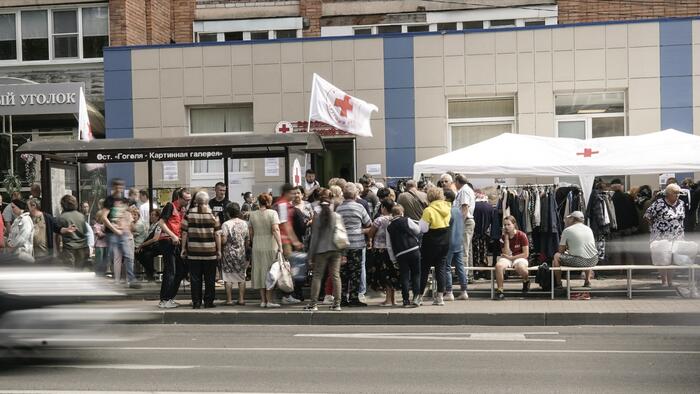In a recent statement, the Kremlin has formally accused Ukraine of detaining over 1,000 residents from the Kursk region against their will amid a cross-border offensive that began in early August. Tatyana Moskalkova, Russia’s presidential human rights commissioner, reported receiving numerous messages from relatives seeking information about these individuals. She emphasized the gravity of the situation, claiming that it constitutes a severe violation of civilian rights and international humanitarian norms. Moskalkova expressed her intention to address this issue directly with the Ukrainian authorities, underscoring that forcibly removing civilians from their homes is a direct breach of the Geneva Convention and should receive appropriate condemnation from the global community.
As the conflict progresses, the Kremlin has also noted that approximately 112,000 residents from the southwest border region have been displaced due to the ongoing hostilities. Social media reports corroborate the existence of citizens, predominantly the elderly, who remain trapped in the conflict-affected areas, unable to evacuate. Moskalkova reported that around 12,000 displaced individuals are living in temporary shelters throughout Russia, with others seeking refuge with relatives in safer locations. While the Kremlin paints a dire picture of the situation, Ukrainian officials assert that their forces are ensuring the humane treatment of civilians in territories they have captured.
In a counter-narrative to Russia’s accusations, Ukrainian leaders have called for investigations by international bodies such as the United Nations and the International Committee of the Red Cross (ICRC) to monitor the situation in Kursk. Ukraine’s Foreign Minister Andrii Sybiha insisted that this invitation was aimed at demonstrating Ukraine’s commitment to international humanitarian law. Despite these efforts, Moscow has pushed back against international scrutiny, demanding that any foreign organization or media outlet seeking to investigate the situation coordinate with the Russian government before accessing the affected areas.
The claims of civilian detentions come amidst rising tensions regarding alleged war crimes committed by both sides. Ukrainian human rights ombudsman Dmytro Lubinets has denounced the reported execution of nine Ukrainian troops by Russian forces in the Kursk region, accusing Moscow of violating the laws of warfare. This allegation aligns with findings from Ukrainian sources, including drone footage that purportedly shows the deceased soldiers, raising questions about the conduct of Russian troops during the ongoing conflict. As of now, Russian officials have remained silent on these grave accusations, further escalating the climate of distrust between the two nations.
Amidst the continuous allegations, Ukrainian President Volodymyr Zelensky affirmed that Ukrainian forces are maintaining their position around Kursk, despite assessments suggesting that the offensive efforts may not significantly influence the front lines in the Donbass region, where Ukrainian troops have encountered substantial losses. Military analysts have pointed out that the operation in Kursk appears to have limited strategic value, indicating a divergence between the desired impact of the offensive and the actual outcomes on the battlefield.
The current situation in Kursk and the surrounding areas exemplifies the complexities of the ongoing conflict between Ukraine and Russia, characterized by a backdrop of humanitarian concerns, war crime allegations, and escalating tensions. With both sides facing accusations of misconduct and a significant number of civilians displaced or caught in the crossfire, the war not only claims military personnel but also exacts a profound toll on innocent lives. As international observers and organizations remain divided on the circumstances and facts at hand, the humanitarian crisis continues to deepen, and the path toward a resolution appears increasingly fraught with challenges.

